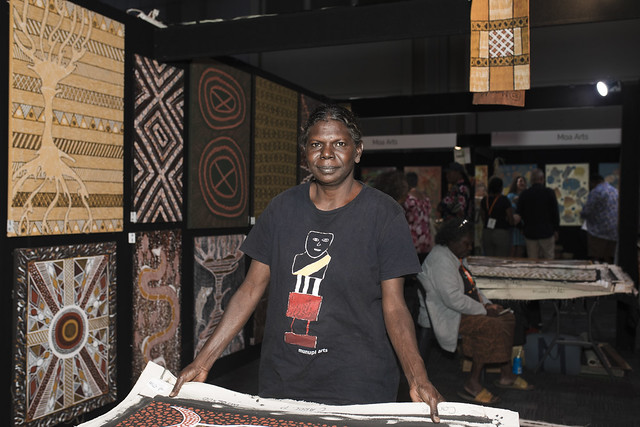Every year, more than 75 Aboriginal and Torres Strait Islander art centres undertake the long and often challenging journey to participate in the Darwin Aboriginal Art Fair on Larrakia Country. But rising travel costs and limited financial support now threaten to exclude many remote art centres from the 2025 edition of the Fair.
DAAF is a significant cultural celebration of First Nations art, design, fashion, performance, and music. It offers a rare opportunity for both established and emerging Indigenous artists to showcase their unique stories and generate vital income from direct sales.
"DAAF is our once-a-year opportunity to connect with the national Indigenous arts community. It gives artists and arts workers a meaningful experience to share stories from our community and to see how national audiences respond to their work," said a spokesperson from Milingimbi Art and Culture, a 2024 DAAF participant from the Northern Territory.
"For Milingimbi, we do not have tourists to buy our work directly and are unable to afford to work consistently through commercial galleries, so this is an important opportunity to sell work directly to the public."
However, without much-needed funding, some remote art centres may not be able to attend the 2025 DAAF, scheduled for August 7 to 10.
"Travel expenses for our organisation alone have more than doubled since pre-COVID times," said Claire Summers, DAAF executive director.
"It is having a major impact on our own operations, the number of artists in attendance, and also on audiences who need to travel to Darwin to be able to attend."
According to DAAF, Art Centre Members spend an average of $12,807 just to attend, with some centres paying up to $36,000.
"The small travel subsidy we do provide barely touches the edges," Ms Summers said.
With art centres based all across the country, many participants face a lengthy and financially demanding journey to Darwin. Some art centres will spend over 20 hours travelling to participate in the Fair, collectively covering more than 107,000 kilometres for the DAAF.
One example is Moa Arts, based on Mua Island in Queensland's Torres Strait.
Artists must first travel by dinghy or small plane to Horn Island, catch a flight to Cairns, and then take a final flight from Cairns to Darwin. Transporting delicate artwork is also a serious concern, especially with pieces at risk of damage during the long sea barge journey.
Moa Arts is not alone in facing these barriers. Another participant, Ngukurr Arts Centre in Arnhem Land, will travel over 1,500 kilometres for the 2025 DAAF, but remains committed to attending.
"DAAF is an essential fixture in the Ngukurr Arts calendar. It's a place to make sales, connect with galleries and collectors," said a Ngukurr Arts Centre spokesperson.
"[It] is essential to a healthy remote Indigenous arts industry."
For all of these remote centres, attending DAAF involves not only financial strain, but also months of planning to ensure artists and artworks arrive safely.
"Art Centres start planning their trip to DAAF as soon as the last one finishes," said Ms Summers. "Accommodation in Darwin is at a premium in August, so the Art Centres know to start preparations early."

In response to the growing need, the Darwin Aboriginal Art Fair Foundation has launched an urgent appeal for travel assistance, calling for public donations by June 30 to help cover critical costs for First Nations artists.
"Donations play such an important role in our ability to keep our Fair free to the public, to keep participation fees for the Art Centres at a minimum, and help us elevate and expand our organisation's events and programs," said Ms Summers.
Showcasing the contemporary fine art and design of more than 75 Aboriginal and Torres Strait Islander Art Centres from across Australia, DAAF is held each August on Larrakia Country in Darwin and also online. The 2025 event expects participation from more than 1,000 First Nations artists.
"There is nothing quite like seeing hundreds of First Nations artists, designers, curators and creatives come to Larrakia Country each year to be inspired by each other, to learn, to connect, and to share," Ms Summers said.
"It is a powerful thing, and a beautiful space for celebration, recognition, and healing. We don't want anyone to miss out on this because travel expenses have become a barrier."
The Foundation's end-of-financial-year appeal is open now. Donations can be made online at https://daaf-travel-appeal-2025.raiselysite.com/.

